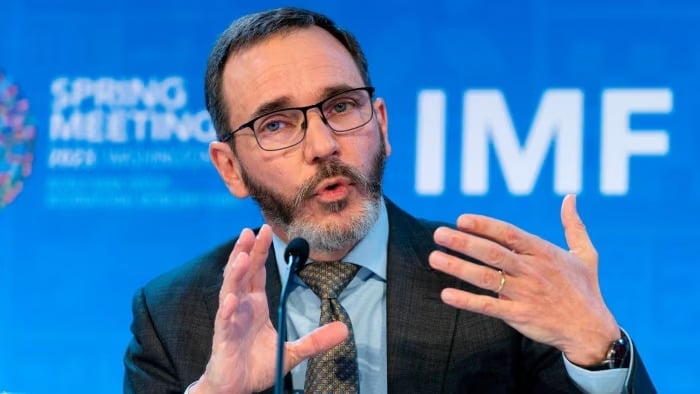Pierre-Olivier Gourinchas, the economic counsellor and director of the research department of the IMF

The International Monetary Fund (IMF) says the global battle against inflation is almost over as the rate is projected to decline to 3.5 percent by the end of 2025.
The IMF said the projection is below the average level of 3.6 percent seen between 2000 and 2019.
But despite the “good news” in the fight against global inflation, Pierre-Olivier Gourinchas, the economic counsellor and director of the research department of the IMF, said countries must prepare for more global economic shocks due to escalating regional conflicts.
Advertisement
Gourinchas spoke on Tuesday at the launch of the World Economic Outlook (WEO) report at the ongoing IMF-World Bank annual meetings in Washington DC.
“The battle against inflation is almost won, after peaking at 9.4 percent year-on-year in the third quarter of 2022, we now project headline inflation will fall to 3.5 percent by the end of next year. And in most countries, inflation is now hovering close to Central Bank targets,” he said.
Gourinchas said the decline in inflation without a global recession is a major achievement, attributing the progress to the unwinding of supply and demand shocks “that caused the inflation in the first place”.
Advertisement
In addition, the IMF official said improvements in labour supply due to immigration in many advanced countries and monetary policy also played “a decisive” role in keeping inflation expectations anchored.
He said despite the disinflation, risks are now tilted to the downside.
This, according to the IMF economic counsellor, includes rising regional conflicts, especially in the Middle East, which could pose serious risks for commodity markets; shifts toward undesirable trade and industrial policies which could significantly lower output, and a sharp reduction in migration into advanced economies, which can unwind some of the supply gains that helped ease inflation in recent quarters.
“This could trigger an abrupt tightening of global financial conditions that would further depress output, and together, these represent about 1.6% of global output in 2026,” he said.
Advertisement
“Now to mitigate these downside risks and to strengthen growth, policymakers now need to shift gears and implement a policy triple pivot. The first pivot on monetary policy is already underway. The decline in inflation paved the way for monetary easing across major central banks.
“This will support activity at a time when labour markets are showing signs of cooling, with rising unemployment rates. However, this rise has been gradual and does not point to an imminent slowdown.”
Gourinchas said lower interest rates in major economies will also ease the pressure on emerging market economies.
‘WHY COUNTRIES MUST PREPARE FOR MORE GLOBAL ECONOMIC SHOCKS’
Advertisement
Stressing the need to remain vigilant, he said inflation in services remains too elevated — almost double pre-pandemic levels.
The economic counsellor also said a few emerging market economies are seeing rising price pressures, calling for higher policy rates.
Advertisement
“Furthermore, We’ve now entered a world dominated by supply shocks from climate health and geopolitical tensions, and this makes the job central banks harder,” he said.
Given the risks, Gourinchas, therefore, warned that countries need to be prepared and have “some room on the fiscal side” as there will likely be more global economic shocks.
Advertisement











